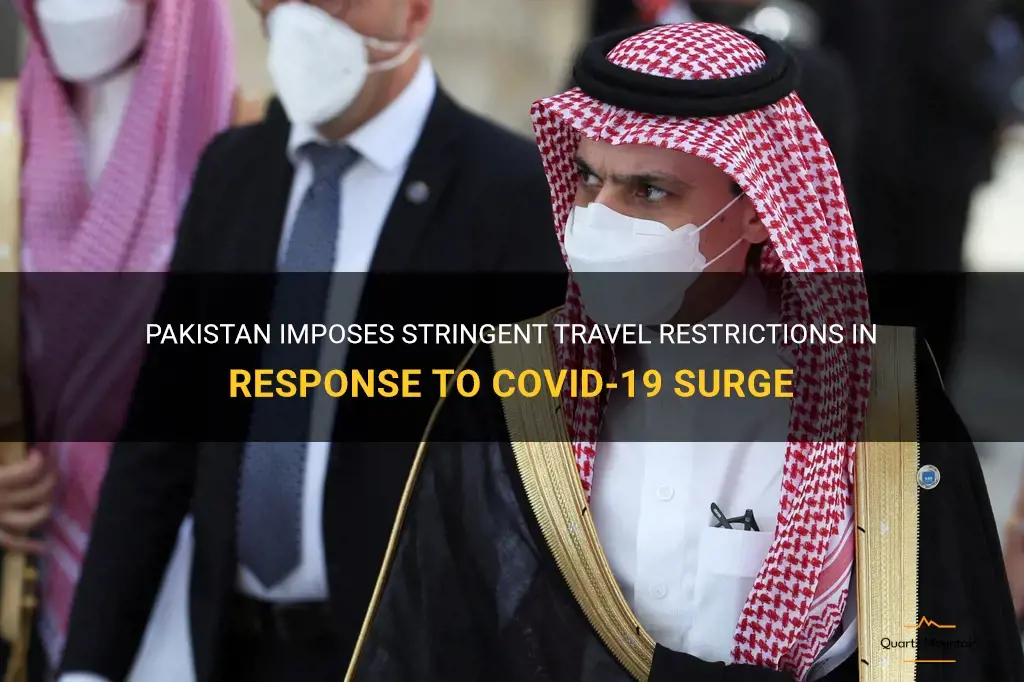
Pakistan, a country steeped in rich history and cultural diversity, has recently experienced its fair share of travel restrictions. The current global health crisis has compelled governments across the world to impose measures to curb the spread of COVID-19. Pakistan, like many other nations, has had to navigate through these uncertain times and implement travel restrictions to protect its citizens and visitors alike. However, amidst the challenges, we must not forget the allure and beauty that await travellers in this enchanting land, making it all the more worth the wait to explore once the restrictions are lifted.
| Characteristics | Values |
|---|---|
| Country | Pakistan |
| Entry Level | Partially Open |
| Travel Ban | Yes |
| Testing Required | Yes |
| Quarantine Required | Yes |
| Health Declaration Form Required | Yes |
| Visa Requirement | Yes |
| Negative COVID-19 Test Result Required | Yes |
| Vaccinated Travelers Allowed | Yes |
| Mask Requirement | Yes |
| Physical Distancing | Yes |
| COVID-19 Health Measures | Yes |
What You'll Learn
- What are the current travel restrictions for Pakistan in light of the COVID-19 pandemic?
- Are there any specific requirements or documents that travelers need to provide before entering Pakistan?
- Are there any specific countries that have imposed travel restrictions or bans on travelers coming from Pakistan?
- Are there any exceptions or special considerations for certain categories of travelers, such as diplomats or healthcare professionals?
- Are there any specific quarantine or testing requirements for travelers arriving in Pakistan?

What are the current travel restrictions for Pakistan in light of the COVID-19 pandemic?
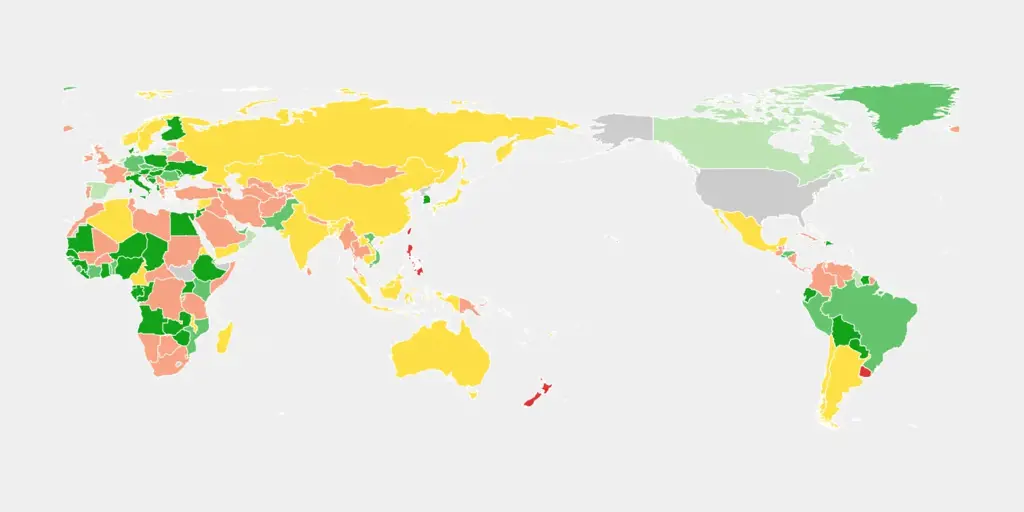
As the COVID-19 pandemic continues to evolve, many countries around the world have implemented travel restrictions to help curb the spread of the virus. Pakistan is no exception, and has imposed its own set of rules and regulations for travelers entering or leaving the country.
Currently, Pakistan has a traffic light system in place for international travel. The system categorizes countries into three colors - green, yellow, and red - based on the COVID-19 situation in each country. The categorization is done by the National Command and Operation Center (NCOC), which keeps a close eye on the global pandemic situation.
Travelers coming from green countries face the fewest restrictions. They are required to provide a negative PCR test taken within 72 hours prior to their departure. There is no mandatory quarantine period upon arrival, and travelers are free to move around the country.
Travelers coming from yellow countries face additional requirements. In addition to providing a negative PCR test, they are required to undergo a mandatory seven-day self-quarantine upon arrival. However, they are allowed to take a second PCR test on the fifth day of their quarantine, and if the test comes back negative, they are free to end their quarantine period.
Travelers coming from red countries face the most stringent restrictions. They must provide a negative PCR test, and are required to undergo a mandatory ten-day quarantine period at a designated facility upon arrival. They are also required to take a second PCR test on the eighth day of their quarantine, and if the test comes back negative, they are allowed to end their quarantine period.
It is important to note that even travelers from green countries may be subject to additional screening measures upon arrival. These measures may include thermal scanning, health questionnaires, and random testing.
In addition to the traffic light system, Pakistan has also suspended inbound flights from certain countries where the COVID-19 situation is particularly severe. These suspensions are reviewed and updated on a regular basis.
It is crucial for travelers to stay updated on the latest travel restrictions before planning their trip to Pakistan. The situation is constantly changing, and it is important to follow the guidelines and instructions provided by the Pakistani authorities.
In conclusion, Pakistan has implemented a traffic light system for international travel, categorizing countries into green, yellow, and red based on the COVID-19 situation. Travelers from green countries face the fewest restrictions, while travelers from red countries face the most stringent measures. It is important to stay informed about the latest travel restrictions and follow the guidelines provided by the authorities to ensure a safe and hassle-free travel experience.
Oregon Implements Air Travel Restrictions to Combat COVID-19 Spread
You may want to see also

Are there any specific requirements or documents that travelers need to provide before entering Pakistan?
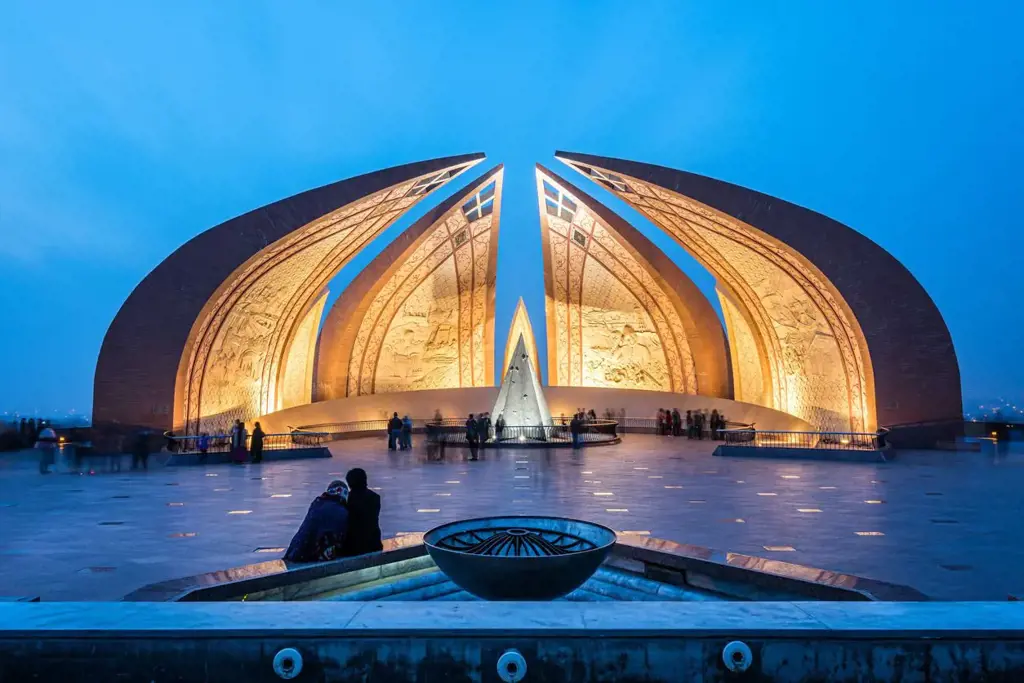
Yes, there are specific requirements and documents that travelers need to provide before entering Pakistan. These requirements and documents are necessary for the safety and security of both the travelers and the country itself.
Firstly, all travelers need to have a valid passport with at least six months of validity remaining. This is a basic requirement for entry into any foreign country and Pakistan is no exception. The passport must also have at least one blank page for immigration stamps.
In addition to a valid passport, travelers also need to have a valid visa to enter Pakistan. There are different types of visas available, depending on the purpose of the visit. Tourist visas, business visas, and student visas are some of the common types. The visa application process can be done online or through the embassy or consulate of Pakistan in the traveler's home country. It is important to apply for the correct type of visa and provide all the necessary documents to support the visa application.
Some of the documents that are commonly required for a visa application to Pakistan include a completed visa application form, a passport-sized photograph, proof of travel arrangements (such as flight tickets), proof of accommodation (such as hotel bookings), and a letter of invitation from a sponsor in Pakistan, if applicable. The specific requirements may vary based on the type of visa and the purpose of the visit.
In addition to the passport and visa requirements, travelers may also be asked to provide proof of financial means to support their stay in Pakistan. This can be in the form of bank statements, credit card statements, or proof of employment and income. The purpose of this requirement is to ensure that travelers have sufficient funds to cover their expenses during their stay in Pakistan and to prevent any potential strain on the country's resources.
Furthermore, travelers are also required to provide proof of vaccination against certain diseases. Pakistan has specific vaccination requirements, including proof of vaccination against yellow fever for travelers arriving from countries with a risk of transmission. It is important to check the specific vaccination requirements for Pakistan and ensure that all necessary vaccinations are up-to-date before traveling.
In conclusion, there are specific requirements and documents that travelers need to provide before entering Pakistan. These include a valid passport, a valid visa, proof of travel arrangements and accommodation, proof of financial means, and proof of vaccination, among others. It is important for travelers to carefully review the requirements and provide all the necessary documents to ensure a smooth entry into Pakistan and a safe and enjoyable visit.
Exploring the Current Travel Restrictions for Morocco: Everything You Need to Know
You may want to see also

Are there any specific countries that have imposed travel restrictions or bans on travelers coming from Pakistan?
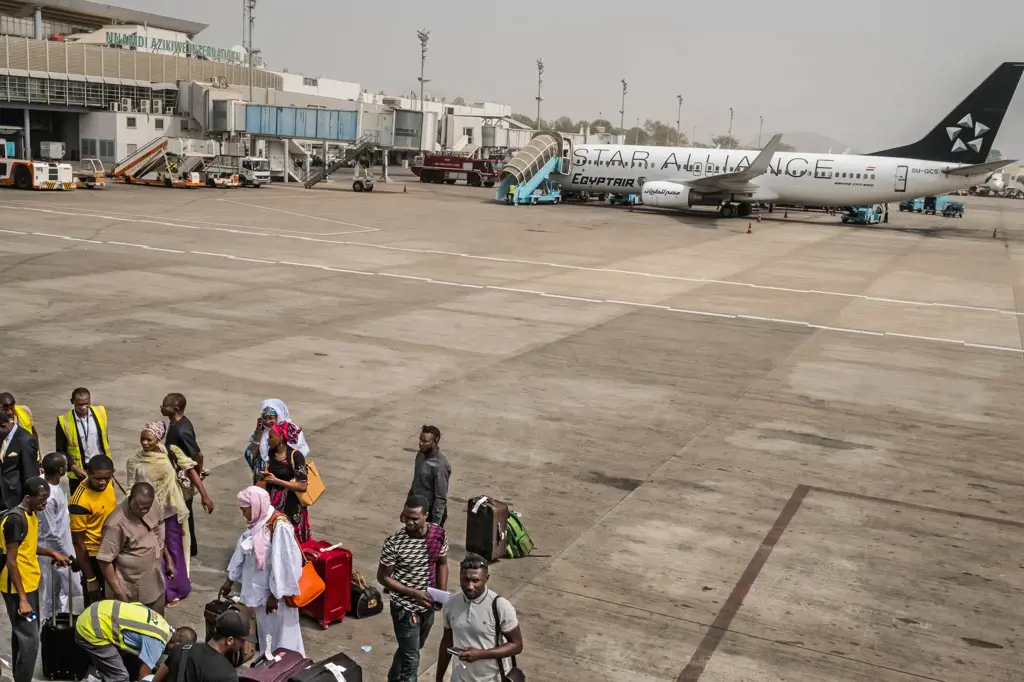
As the global concern for COVID-19 continues, many countries have imposed travel restrictions and bans to prevent the spread of the virus. Pakistan, like many other countries, has also faced travel restrictions and bans imposed by various nations. These restrictions have been put in place to mitigate the risks associated with the pandemic and to ensure the safety of their own citizens. It is important for travelers to be aware of these restrictions before planning their trips.
One specific country that has imposed travel restrictions on travelers coming from Pakistan is the United Kingdom. In June 2021, the UK added Pakistan to its "red list," which means that travel from Pakistan is strictly controlled. Only British and Irish nationals, or those with residence rights in the UK, are allowed to enter the country from Pakistan. However, even these individuals are required to undergo mandatory hotel quarantine upon arrival.
Other countries, such as Saudi Arabia, have also imposed similar restrictions on travelers coming from Pakistan. Saudi Arabia has temporarily suspended travel and entry for people coming from Pakistan, as well as several other countries, as a precautionary measure to prevent the spread of the virus. These restrictions are subject to change, so it is essential to stay updated with the latest travel guidelines before planning any international travel.
While these are some examples of countries that have imposed travel restrictions or bans on travelers coming from Pakistan, it is important to note that the situation is constantly evolving. Different countries may implement or lift restrictions based on their assessment of the current COVID-19 situation.
To ensure a smooth and hassle-free travel experience, it is advisable for travelers to:
- Check Travel Advisories: Stay updated with the latest travel advisories issued by the government of Pakistan and the destination country. These advisories provide essential information regarding travel restrictions, quarantine requirements, and other guidelines related to COVID-19.
- Contact the Embassy or Consulate: Reach out to the embassy or consulate of the destination country for accurate and up-to-date information on travel restrictions. They can provide guidance on entry requirements and any additional documents or tests that may be required.
- Follow Health and Safety Guidelines: It is crucial to adhere to health and safety guidelines to protect oneself and others from the virus. This includes wearing masks, maintaining social distance, and practicing good hygiene habits while traveling.
- Have Appropriate Documentation: Ensure that all necessary travel documents, such as passports, visas, and health certificates, are in order. Some countries may require additional documentation, such as proof of vaccination or negative COVID-19 test results, so it is important to be prepared.
- Consider Travel Insurance: It is recommended to have travel insurance that covers any unexpected events, including trip cancellations due to travel restrictions or bans. Review the coverage and terms of the insurance policy to understand the extent of protection provided.
By staying informed and prepared, travelers can navigate the evolving travel restrictions and ensure a safe and smooth journey. It is important to prioritize health and safety and follow the guidelines and regulations set by the destination countries.
A Guide to the Current Saudi Travel Restrictions: What You Need to Know
You may want to see also

Are there any exceptions or special considerations for certain categories of travelers, such as diplomats or healthcare professionals?

When it comes to travel, there are often exceptions and special considerations for certain categories of travelers. This is especially true for diplomats and healthcare professionals, who may have unique needs or obligations that require special treatment or accommodations.
Diplomats, for example, often enjoy special privileges and immunities while traveling. These privileges are granted under international law and are designed to enable them to carry out their diplomatic functions without unnecessary hindrance. Diplomats may be exempt from certain travel restrictions or requirements, such as visa requirements or border control procedures. They may also have access to special diplomatic lanes at airports, which can help expedite their entry into a country.
In addition to these travel privileges, diplomats may also have access to diplomatic immunity. This means that they are immune from the jurisdiction of the host country's courts and cannot be arrested or prosecuted for any official acts performed in the course of their duties. This immunity extends to their personal belongings and documents, which are protected from search and seizure by the host country's authorities.
Healthcare professionals, on the other hand, may have special considerations related to their profession. For example, healthcare professionals may be required to travel to other countries to provide medical assistance in times of crisis or to participate in medical conferences or training programs. In such cases, they may be granted special visas or travel permits to facilitate their travel and ensure they can carry out their work effectively.
In some cases, healthcare professionals may also be subject to additional health and safety requirements. For example, during a pandemic or public health emergency, healthcare professionals may need to undergo additional testing or quarantine procedures to ensure they are not carrying and spreading infectious diseases. These requirements are put in place to protect both the healthcare professionals themselves and the communities they serve.
It's important to note that while diplomats and healthcare professionals may enjoy certain exceptions and special considerations, they are still subject to the laws and regulations of the countries they are travelling to. These exceptions are granted to enable them to fulfill their duties and responsibilities, but they should still conduct themselves in a manner that respects the host country's laws and customs.
In conclusion, diplomats and healthcare professionals are often afforded exceptions and special considerations when traveling. These exceptions and considerations are granted to enable them to carry out their duties effectively and to ensure their safety and well-being. However, it's important for these travelers to be aware of and abide by the laws and regulations of the countries they are visiting, even if they may enjoy certain privileges or immunities.
Exploring the Impact of Travel Restrictions on Pulmonary Embolism Patients
You may want to see also

Are there any specific quarantine or testing requirements for travelers arriving in Pakistan?
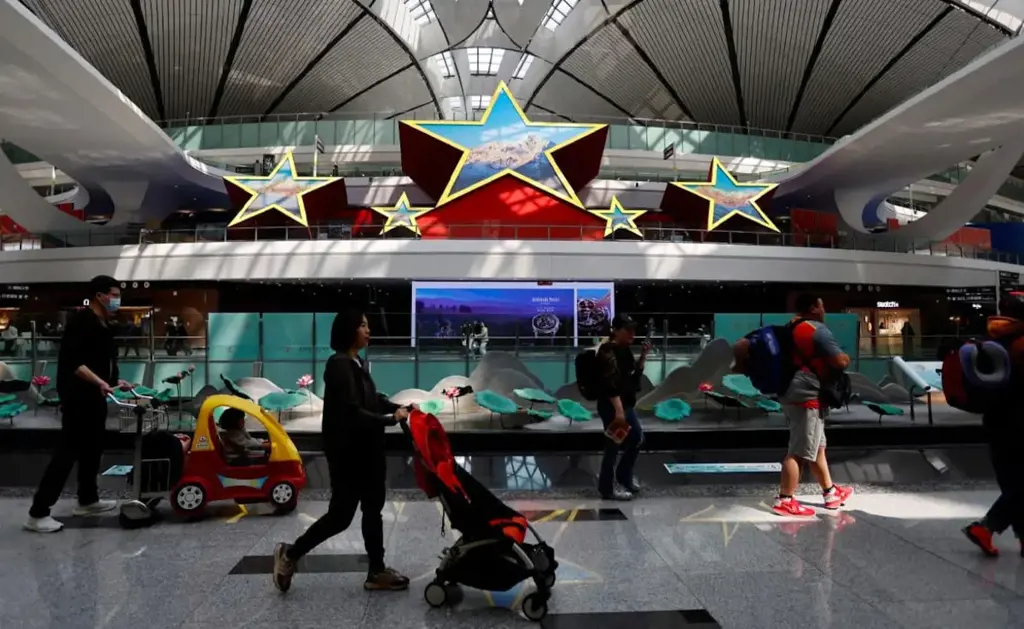
Yes, there are specific quarantine and testing requirements for travelers arriving in Pakistan. The government of Pakistan has implemented these measures to prevent the spread of COVID-19 and protect the local population.
Upon arrival, all travelers are required to have a negative PCR test conducted within 72 hours before their departure to Pakistan. This test should be conducted by a recognized laboratory and the results should be presented to the airline staff before boarding.
In addition, travelers are also required to undergo a second PCR test upon arrival in Pakistan. This test is conducted at the airport by the health authorities. The cost of this test is covered by the traveler and should be paid at the time of arrival. Once the test is conducted, travelers are required to complete a 7-day self-isolation period at their chosen residence or hotel.
During the self-isolation period, travelers are advised to monitor their health and report any symptoms to the local health authorities. They should also adhere to all health and safety protocols, such as wearing masks, practicing social distancing, and regularly sanitizing their hands. Additionally, travelers are required to install and activate the Pass Track mobile app for tracking and tracing purposes.
After the completion of the 7-day self-isolation period, travelers are required to undergo a third PCR test. This test is conducted by the health authorities, and the cost is again covered by the traveler. If the test result is negative, the traveler is allowed to end the self-isolation and continue with their stay in Pakistan. However, if the test result is positive, the traveler will be required to follow the guidelines and protocols outlined by the local health authorities for COVID-19 treatment and isolation.
It is important to note that these requirements and protocols may change or vary depending on the current situation and government regulations. Therefore, it is recommended for travelers to check the latest updates and guidelines before planning their trip to Pakistan. This can be done by visiting the official websites of the government and health authorities or contacting the nearest Pakistani embassy or consulate.
In conclusion, travelers arriving in Pakistan are required to have a negative PCR test before departure and undergo testing and self-isolation upon arrival. Adhering to these requirements and following the health and safety protocols is crucial in preventing the spread of COVID-19 and protecting the health of the local population.
Understanding Travel Restrictions: How to Notify the Consular Office about Your Petition
You may want to see also
Frequently asked questions
Yes, there are travel restrictions currently in place for Pakistan. The government has implemented various measures to control the spread of COVID-19, including travel restrictions and screening procedures for incoming travelers.
Yes, foreigners can still travel to Pakistan during the pandemic. However, they are required to adhere to certain protocols and guidelines set by the government. This may include providing negative COVID-19 test results, mandatory quarantine, and following any additional restrictions implemented by the authorities.
Yes, there is a mandatory quarantine period for travelers arriving in Pakistan. The duration of quarantine may vary depending on the country of origin and the individual's COVID-19 test results. It is advisable to check the latest guidelines and requirements before planning your travel to Pakistan.
Yes, Pakistani citizens can still travel abroad during the pandemic. However, they are advised to check the travel restrictions and requirements of the destination country before making any travel plans. It is important to stay updated with the latest information and guidelines provided by the government and authorities.
To travel to Pakistan during the pandemic, you may need to provide certain documents and fulfill specific requirements. This may include a negative COVID-19 test result, a valid passport, a visa (if required), and any other documents specified by the government or airline. It is crucial to check the latest travel advisories and requirements before your departure to avoid any inconveniences.







